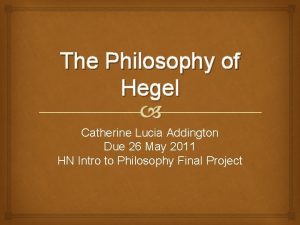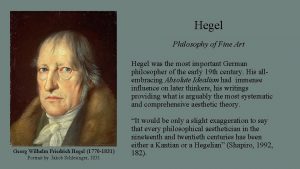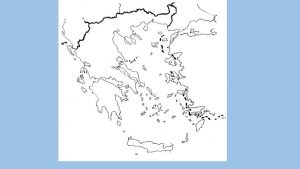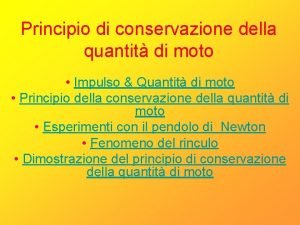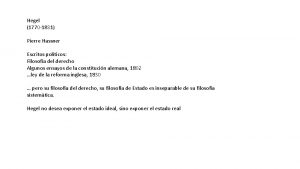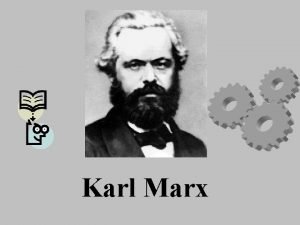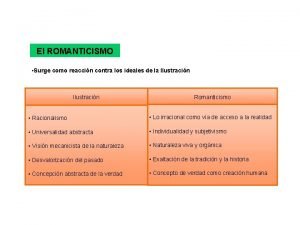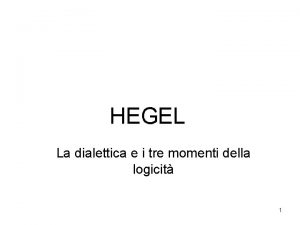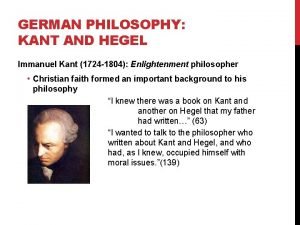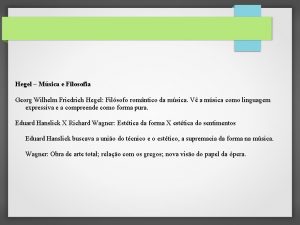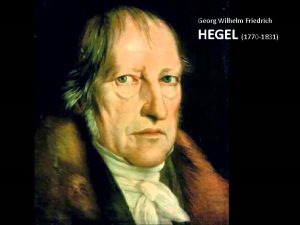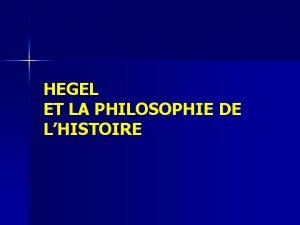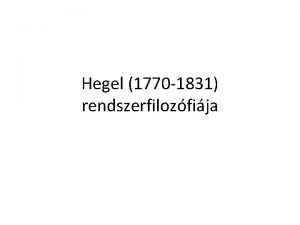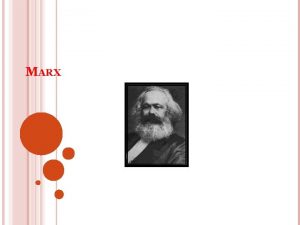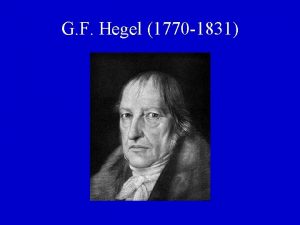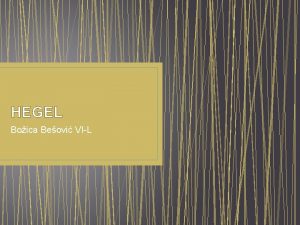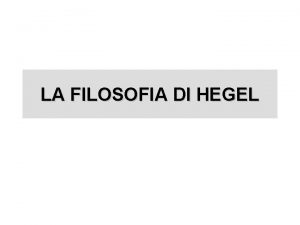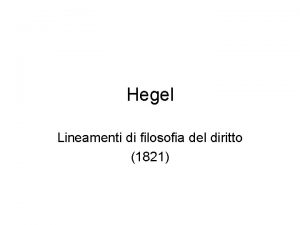The Philosophy of Hegel Catherine Lucia Addington Due











- Slides: 11

The Philosophy of Hegel Catherine Lucia Addington Due 26 May 2011 HN Intro to Philosophy Final Project

Who was Hegel? Georg Wilhelm Friedrich Hegel was born in Stuttgart, Germany, in 1770. Hegel worked as a professor in various German universities, where he became well acquainted with Romanticism, to which his ‘Hegelianism’ would largely be a response.

Who was Hegel? Hegel’s work is normally categorized as German idealism, and he is considered specifically to be an absolute idealist. Hegel was influenced by Immanuel Kant, and Hegel’s work in the philosophy of history would influence Karl Marx. Like the earlier philosophers, Hegel tried to keep his philosophy systematic, with a logical “starting point” (the way Descartes did with cogito, ergo sum). Hegel’s Influence Descartes, Kant, Romanticism Hegel Marx, Nietzsche, Sartre

Absolute Idealism Hegel is considered the creator of the school of thought called absolute idealism. Some background: Kant’s transcendental idealism and Berkeley’s subjective idealism state that reality is essentially based on perception. Hegel disagreed, and published this alternate theory. Absolute idealism describes how being is an allinclusive whole. This means that since the subject (a thinking being) can know an object (the world), there must be some sort of identity that connects the two, or else there would be no certain way of knowing anything.

The “World Spirit” To the Romantics, the “world spirit” was the term they used for the deepest meaning of life. In Hegel’s work, the “world spirit” (Weltgeist) is reason itself. Hegel believed that the “world spirit” is continuously expanding toward knowledge of itself. The “world spirit” comes to know itself in three stages: the subjective spirit (the individual), the objective spirit (the family, society, and state), and the absolute spirit (art, religion, and philosophy).

The Dialectic Process First, someone puts forth a claim: this is called a thesis. Then, someone else puts forth a contradictory claim: an antithesis. A third party forms a synthesis, which accommodates the best of both points of view. Hegel’s favorite example was that thesis of being and the antithesis of non-being, or nothing, was resolved in the synthesis of becoming.

The Dialectic Process Not Dialectic Synthesis: Blue Antithesis: Yellow Synthesis: Green Dialectic Synthesis: Blue -> Baby Blue Antithesis: Yellow -> Pale Yellow Synthesis: Mint Green To Hegel, the dialectic process is an observed historical phenomenon – not a “prediction” – in which the best of two opposing points of view are “sublated, ” or combined.

Hegel’s Philosophy of History His philosophy was mostly a method for understanding history. He believed that philosophers, and all thinkers, could not be considered outside their historical context. The reason he stressed this is because his belief on truth was that since the basis of human understanding changes from one generation to the next, there is no eternal truth, but rather right and wrong relate to a certain historical context. In fact, to Hegel, “truth” was that same process of history – in a sense.

“Truth” in Hegel “Truth” is not an objective entity. “Truth” is also not subjective in the sense that it is “up to” the individual. Truth is an evolving reality that develops in the same way that the “world spirit” does, but toward full truth rather than toward full knowledge of itself. So “truth” isn’t really a thing of the moment; rather it’s a sort of living, growing being that develops alongside history and humanity.

Hegel, Summarized Absolute idealism states that being is an allinclusive whole, making it possible for a subject to know an object. The “world spirit”, or human reason, is in the process of coming to know itself, which is history. This process is called the dialectic process, which consists of a thesis, an antithesis, and a synthesis. Since actions can be right or wrong in a given historical context, there is no eternal truth, but rather truth develops alongside the historical process.

Bibliography Gaarder, Jostein. Sophie’s World. Trans. Paulette Møller. New York: Farrar, Straus and Giroux, 2007. Print. Redding, Paul. “Georg Wilhelm Friedrich Hegel. ” Stanford Encyclopedia of Philosophy. 22 July 2010. Web. 12 May 2011.
